Vi state chiedendo se sia il caso di installare plugin che non sono stati testati con la versione attuale di WordPress?
A volte capita di trovare il plugin perfetto per il vostro sito, ma non è stato testato con l’ultima versione di WordPress. Potreste non sapere se potete utilizzarlo senza rompere il vostro sito web.
In questo articolo discuteremo se è possibile installare in modo sicuro i plugin che non sono stati testati con la versione corrente di WordPress.
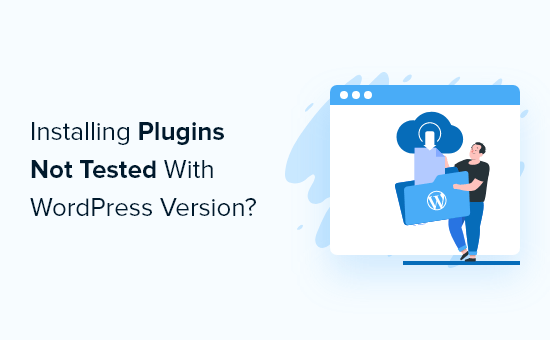
Come fa WordPress a ottenere l’informazione “Plugin non testato”?
Vi state chiedendo come fa WordPress a sapere se un plugin è stato testato con la vostra versione di WordPress o chi è responsabile del test?
Quando inviano i plugin alla directory dei plugin di WordPress, gli autori sono tenuti a includere un file “readme” insieme al loro plugin. Questo file viene utilizzato da WordPress per creare la pagina contenente i dettagli del plugin.
Gli autori dei plugin sono responsabili di testare i loro plugin con l’ultima versione di WordPress e di aggiornare manualmente il numero di versione nel loro file readme.
Se vedete il messaggio “Questo plugin non è stato testato con l’ultima versione di WordPress”, significa che l’autore del plugin non ha aggiornato il file readme con l’ultima versione di WordPress.
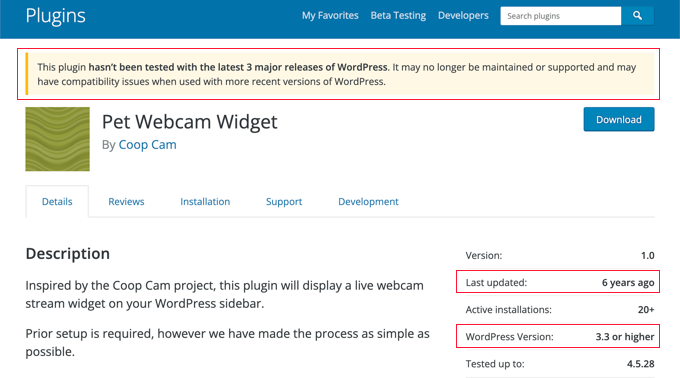
Questo non significa necessariamente che il plugin causerà errori di WordPress.
Perché gli autori dei plugin di WordPress non aggiornano i file Readme?
A volte, gli autori dei plugin non aggiornano i loro file readme anche quando testano il loro plugin per farlo funzionare con ogni nuova versione di WordPress.
In un mondo ideale, queste informazioni vengono aggiornate ogni volta che un plugin viene testato per essere compatibile con l’ultimo aggiornamento di WordPress.
Tuttavia, molti sviluppatori sono solitamente impegnati in progetti di sviluppo a pagamento. Poiché i plugin elencati nel repository dei plugin di WordPress sono gratuiti, gli sviluppatori sono meno incentivati a mantenere costantemente aggiornati i plugin e il file readme.
Dovreste installare i plugin di WordPress che non sono stati testati?
La risposta breve è: dipende dal plugin.
Il fatto che l’autore di un plugin non abbia aggiornato il file readme non significa che il plugin non sia stato testato e che non funzioni con l’ultima versione di WordPress.
Per lo più, dipende dalla funzionalità del plugin e dalla sua complessità. Ad esempio, ci sono plugin semplici che si agganciano direttamente al nucleo di WordPress e non hanno bisogno di essere aggiornati per anni per funzionare correttamente.
Il messaggio “non testato” non dice che il plugin ha problemi o problemi di sicurezza. Dice semplicemente che lo sviluppatore non ha recentemente testato il plugin o aggiornato il file readme.
Qui a WPBeginner, in alcune circostanze suggeriamo di installare plugin che non sono stati testati con la versione recente di WordPress. Testiamo accuratamente il plugin per assicurarci che funzioni come dovrebbe.
Se state leggendo uno dei nostri tutorial su WordPress pubblicati di recente, significa che il plugin era compatibile con l’ultima versione di WordPress quando lo abbiamo testato.
Un altro modo per verificare se è il caso di installare il plugin è andare alla pagina di sviluppo del plugin. Questo mostra quanto è attivo lo sviluppatore del plugin.
Basta andare alla pagina del plugin di WordPress e fare clic sulla scheda “Sviluppo”.
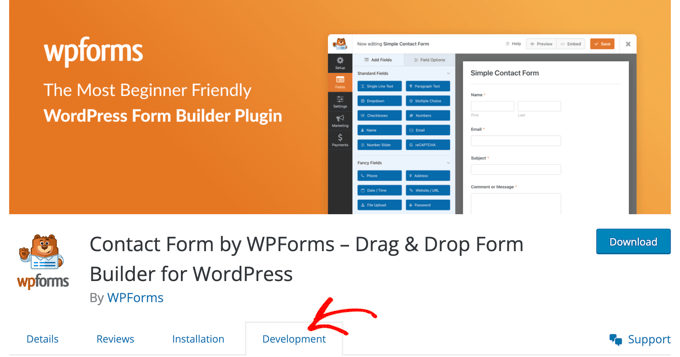
Qui è possibile vedere quando il plugin è stato aggiornato l’ultima volta e le recenti modifiche e miglioramenti apportati al plugin nella sezione “Changelog”.
Se lo sviluppatore aggiorna attivamente il plugin, di solito significa che il plugin è di alta qualità e sicuro da usare sul vostro sito WordPress.
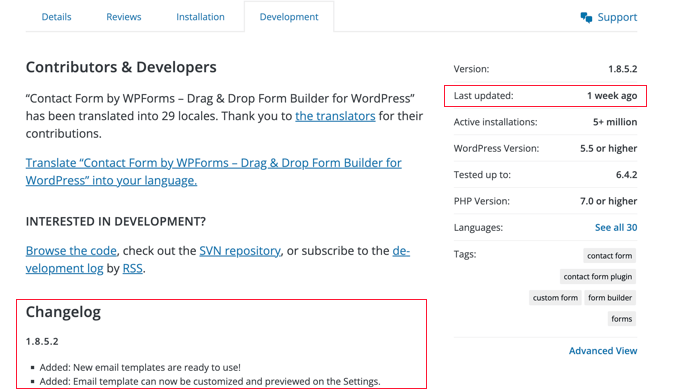
D’altra parte, se un plugin non viene aggiornato da più di due anni, spesso significa che è stato abbandonato. In questo caso, non si dovrebbe installare il plugin perché lo sviluppatore non lo mantiene attivamente.
È inoltre possibile fare clic sulla scheda “Recensioni” per vedere altre opinioni ed eventuali reclami sull’incompatibilità.
Se le recensioni sono recenti e a cinque stelle, è lecito pensare che il plugin possa essere utilizzato sul vostro sito web.
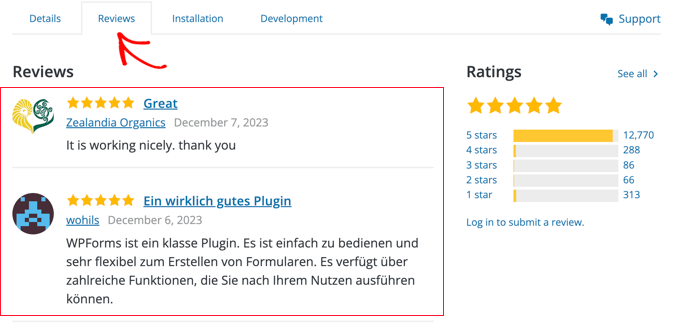
Infine, è possibile testare il plugin su un’installazione locale di WordPress. In questo modo è possibile verificare se ci sono problemi o conflitti senza influenzare il sito principale.
Speriamo che questo articolo vi abbia aiutato a capire se è il caso di installare plugin che non sono stati testati con la vostra versione di WordPress. Potreste anche voler consultare la nostra guida sulla differenza tra un nome di dominio e un web hosting o la nostra selezione di esperti sui migliori servizi di email marketing per le piccole imprese.
Se questo articolo vi è piaciuto, iscrivetevi al nostro canale YouTube per le esercitazioni video su WordPress. Potete trovarci anche su Twitter e Facebook.





Syed Balkhi says
Hey WPBeginner readers,
Did you know you can win exciting prizes by commenting on WPBeginner?
Every month, our top blog commenters will win HUGE rewards, including premium WordPress plugin licenses and cash prizes.
You can get more details about the contest from here.
Start sharing your thoughts below to stand a chance to win!
Moinuddin Waheed says
Most of the time many of us don’t install a plugin only because it has not been tested for the recent updates of the WordPress.
Thank you for the clarification that it doesn’t matter if it has not been tested and why it doesn’t matter whether it has been tested or not.
The functionality of the plugin is what decides it’s usability and whether it should be installed or not as wordpress review team already would have passed the checklist.
WPBeginner Support says
Glad we could help understand what to expect with the message
Admin
Jiří Vaněk says
Thank you for the explanation. I always check this data before installing plugins and it never occurred to me that it works like this and the data just might not be up to date. So I’m assuming you’re then looking for information directly on the developer’s website?
WPBeginner Support says
Not always the developer’s site, you can also check the support forum for the plugin for if they are answering support questions.
Admin
Jiří Vaněk says
Thanks, I’ll know it next time. I’ve abandoned many plugins like this out of fear that even the author doesn’t care. This is big news for me.
Moinuddin Waheed says
Thanks for clearing the doubts related to plugin update and it’s installation.
I have always took a step back while deciding to install a plugin for certain functionality as I have always get a fear of security vulnerabilities if the plugin is not updated in recent especially with WordPress updates.
Is there a mechanism used by wordpress plugin repository before allowing any one to submit plugins available for download to ensure compatibility and security?
or anyone can just add plugin to wordpress plugin repository available for download?
WPBeginner Support says
There is a review process for any plugin submitted to the WordPress.org plugin repository that would review a plugin before it is added.
Admin
Jiří Vaněk says
So I’m assuming that some simple vulnerability testing of the code is also part of this process, or is that solely the responsibility of the plugin developer?
WPBeginner Support says
The review process checks the security, documentation, and presentation of the plugins added to the WordPress plugin repository. The plugin developer should be the one to manage the security of the plugin but the second check is there from the WordPress.org plugin review team to be safe.
Jiří Vaněk says
Wow, thank you wpbeginner team, for the clarification. I didn’t know this. It’s great to hear that not just anything gets into WordPress. Great
Andrew says
WordPress removed the compatibility section so now it’s impossible to vote. the warning means nothing at all, please confirm it and update.
WPBeginner Support says
Thank you for letting us know, we will certainly look into updating our article
Admin
sazi says
thank you
Prashant Ranjan says
First of all thanks for this great eye opening article and clearing all doubts related to installing untested plugins. I have always hesitated installing untested plugins despite its great reviews just because it has not been tested for a particular theme. For example, I abstained from installing Google official Adsense plugin with my existing theme for my travel website for the same reason. Placing ads manually on each post is tedious so I will try it now. But how Google has not updated it’s read me file for Adsense plugin, is out of my understanding.
Nouman Younas says
I was searching for this topic.
recently checked my plugins and half of them not updated from months and some not updated from 2-3+ years.
I don’t know what to do… i preferred to disable those plugins which are not compulsory.
WPBeginner Support says
As mentioned in the article above, sometimes plugin author don’t feel the need to update the plugin if there is nothing broken. If a plugin is working fine on your site and it hasn’t been updated for less than 2 years, then you can use it. If its older than 2 years, then you should stop using it and find an alternative plugin.
Admin
Nouman Younas says
thank you for answer
Yes. Finally i decided to remove those old plugins. some have not alternative like “currencyr”.
I guess, going for premium plugin is a good option or something else.
WPBeginner Support says
Glad you found it helpful. Did you checkout WP Currency Converter?
Kitty says
Thank you for this advice! So far in my minimal WP experience, I have steered clear of plugins that were not compatible with the most current version of my theme because I wouldn’t have a clue of how to fix something if the plugin adversely affected what I previously set up. Having the 2-year rule of thumb helped me decide to use a plugin that has not been updated in 1 year…so far so good (the plugin is the TinyMCE Spellcheck).
Doug says
Great detail and advice. I have been knocking this around in my head for so long I can’t tell you how much I appreciate the details!
Keith Davis says
Good advice and thanks for the additional info about plugins not updated for two years.
Makes perfect sense.
Peter Cralen says
Why somebody will install plugin if developer is even not able to update one number in readme file?
It is like purchase service from hosting company where their home page is down
WPBeginner Staff says
That’s the point you didn’t purchase it. It is available for free with no warranty and very limited support.
Peter Cralen says
I think price is not value, does not matter if its free or paid.
Better will be if people stay focused on quality instead of take something for free, bc. its free only.
Joel James says
I agree with you. Why can’t you test it your own, when it is free and you need it? Developers may not get time to update readme text on each WordPress updates. No point of complaining about it, since they are giving their work for free!!
Angélica Costa says
Because that plugin sometimes is the only one that works for you. And just because it hasn’t been updated, it does not mean in any way that is does not work.
And that is partially due to the awesome WordPress retrocompatibility.
Ryan Hellyer says
Some people refuse to update the readme because when doing that you also need to do a version number bump, which in turn triggers a release and causes users to need to update.
You can modify the readme without bumping your version number and hence triggering an update, but then you have multiple copies of the same plugin with the same version number which are not identical. Aside from feeling just wrong, that could theoretically trip up a security system which does a hash of the file system and checks with a known set of previously downloaded plugins.